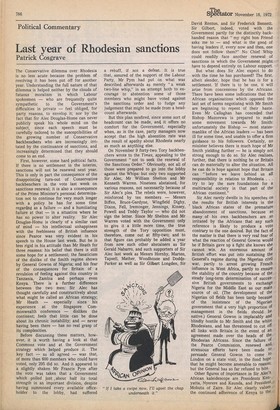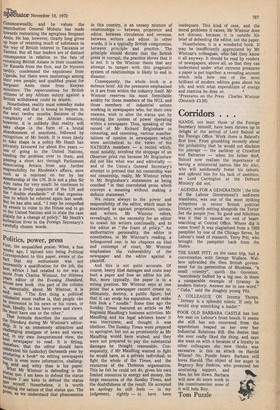Political Commentary
Last year of Rhodesian sanctions
Patrick Cosgrave
The Conservative dilemma over Rhodesia is no less acute because the problem of resolving it has been put off for another year. Understanding the full nature of that dilemma is helped neither by the clouds of fatuous moralism in which Labour spokesmen — who are frequently quite sympathetic to the Government's difficulties in private — feel obliged, for party reasons, to envelop it; nor by the fact that Sir Alec Douglas-Home can never publicly speak his whole mind on the subject, since each speech must be carefully tailored to the susceptibilities of the growing number of Conservative backbenchers who are increasingly irritated by the continuance of sanctions, and increasingly determined that they should come to an end.
First, however, some hard political facts. If there is no settlement in the interim, sanctions will not be renewed next year. This is only in part the consequence of the disappointing turn-out of Conservative backbenchers in the vote last week on sanctions renewal; it is also a consequence of the Prime Minister's personal determination not to continue for very much longer with a policy he has for some time regarded as a failure — and a humiliating failure at that — in a situation where he has no power to alter reality. Sir Alec Douglas-Home is clearly of a similar cast of mind — his intellectual unhappiness with the feebleness of British influence since Pearce was very evident in his speech to the House last week. But he is less rigid in his attitude than Mr Heath for three reasons: his belief that there is still some hope for a settlement; the fanaticism of the dislike of the Smith regime shown by General Gowon of Nigeria; and his fear of the consequences for Britain of a revulsion of feeling against this country in Tanzania, Zambia and perhaps even Kenya. There is a further difference between the two men: Sir Alec has thought carefully and constructively about what might be called an African strategy; Mr Heath — especially since his experience at the Singapore Commonwealth conference — dislikes the continent; feels that little can be done about its chronic instability; and — never having been there — has no real grasp of its complexities.
Before discussing these matters, however, it is worth having a look at that Commons vote and at the Government strategy which helped produce it. The key fact — as all agreed — was that, of more than 600 members who could have voted, only 295 did so. And it appeared to a slightly shaken Mr Francis Pym after the vote was taken that a Government which polled just , about half its total strength in an important division, despite having summoned every available officeholder to the lobby, had suffered a rebuff, if not a defeat. It is true that, assured of the support of the Labour Party, Mr Pym had put on what was described afterwards as merely "a weak two-line whip," in an attempt both to encourage to abstention some of those members who might have voted against the sanctions order and to fudge any judgement that might be made from a headcount afterwards.
But this plan misfired, since some sort of headcount can be made, and it offers no comfort for the Government, especially when, as is the case, party managers now accept that the high absention rate was the result of apathy about Rhodesia nearly as much as anything else.
On November 9 forty-two Tory backbenchers wrote to the Times, appealing to the Government "not to seek the renewal of the Sanctions Order." Obviously, not all of those were prepared to go into the lobby against the Whips: but only two supported Sir Alec, Mr William Shelton and Mr Kenneth Warren. Nineteen abstained, for various reasons, not necessarily because of Sir Alec's plea. The rebels were, however, reinforced by ten members — Messrs Biffen, Bruce-Gardyne, Wingfield Digby, Dixon, Fell, Iremonger, Jennings, Kinsey, Powell and Teddy Taylor — who did not sign the letter. Since Mr Shelton and Mr Warren voted with the Government only to give it a little more time, the true strength of the Tory opposition must, therefore, come out at fifty-two; and to that figure can probably be added a year from now such other abstainers as Sir Gerald Nabarro, and such supporters of Sir Alec last week as Messrs Hornby, Marten, Tapsell, Mather, Woodhouse and DoddsParker as well as Sir Gilbert Longden, Sir
David Renton, and Sir Frederick Bennett. Sir Gilbert, indeed, voted with the Government partly for the distinctly backhanded reason that "my right hon Friend asks me to — and what is the good of having leaders if, every now and then, one does not follow them?" No Chief Whip could readily face another renewal of sanctions in which the Government ,might; have to depend entirely on Labour support. 0
But what does Sir Alec expect to do with the time he has purchased? The first, albeit slender, hope that he has is for a settlement. If there is to be one, it will arise from concessions by the Africans. There have been some indications that the African organisations which opposed the last set of terms negotiated with Mr Smith are beginning to repent of their haste, Even Mr Callaghan has conceded that Bishop Muzorewa is prepared to make some movement towards Mr Smith: unfortunately the Bishop — most statesmanlike of the African leaders — has been ill for some time, and unable to offer a firm guidance to his followers. Certainly, no minister believes there is much hope of Mr Smith yielding further — he is simply not strong enough to do so. Sir Alec realises, further, that there is nothing he or Britain can do materially to alter the situation. All he can do is hope against hope that Britain can "before we leave behind us all responsibility in relation to Rhodesia . . • try to lay the sure foundations for a multiracial society in that part of the African continent."
Sir Alec rarely dwells in his speeches on the results for British interests in the black African states of the premature abandonment of sanctions, because so many of his own backbenchers are so irritated by the Africans that any such reference is likely to produce a vote contrary to the one desired. But the fact of the matter is that there is very real fear of what the reaction of General Gowon would be if Britain gave up a fight she knows she cannot win. An enormous amount of British effort was put into sustaining the General's regime during the Nigerian civil war, partly to arrest growing French influence in West Africa, partly to ensure the stability of the country because of the steady long-term determination of successive British governments to exchange Nigeria for the Middle East as our main source of oil. (The development of the Nigerian oil fields has been tardy because of the insistence of the Nigerian government that a very high proportion of management in the fields should be native.) General Gowon is implacably and blindly hostile to Mr Smith and the white Rhodesians, and has threatened to cut off
all links with Britain in the event of an agreement made over the heads of the Rhodesian Africans. Since the failure of the Pearce Commission, renewed and strenuous efforts have been made t° persuade General Gowon to come t° London on a state visit, in the fond hope that he might become amenable to reason; but the General has so far refused to bite.
Other figures of importance in Sir Alec s African kaleidescope are Presidents Kenyatta, Nyerere and Kaunda, and President, p Mobutu of Zaire. Sir Alec clearly values the continued adherence of Kenya to the
Commonwealth; and he values the contribution General Mobutu has made towards restraining the egregious Sergeant Amin. He has, however, clearly long given 111) hope of retaining much of substance in the way of British interest in Tanzania or Zambia. But all four leaders are of distinct consequence in relation to the fate of remaining British Asians in their countries. Dr Kaunda from the first, and Dr Nyerere tardily, condemned the expulsions from Uganda, but there were mutterings among their own people; and qualified praise for Sergeant Amin came from Kenyan ministers. The repercussions for British citizens of any African outcry against a British withdrawal could be drastic.
Nonetheless, reality must someday make itself felt; and that is bound to happen in the next twelve months. Because of the complexity of the African situation, however, it is unlikely that reality will take shape in the form of a brutal abandonment of sanctions, followed by recognition of Mr Smith. It is more likely to take shape in a policy Mr Heath has Privately favoured for about five years — one of going to the United Nations, handing the problem over to them, and Passing a short Act through Parliament dissociating Britain from any further responsibility for Rhodesia's affairs, save such as is enjoined on her by her Membership of the UN. It is not a plan Sir Alec cares for very much: he continues to harbour a lively suspicion of the UN and the "double standards" of that organisation to which he referred again last week. But he has also said, "I may be compelled hlr events to come to the House and to go to the United Nations and to state the case plaanly for a change of policy." Mr Heath's Inclination lives in the Foreign Secretary's carefully chosen words.



















































 Previous page
Previous page